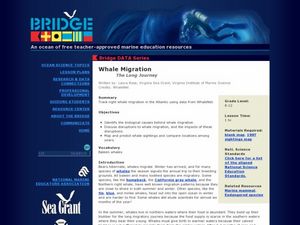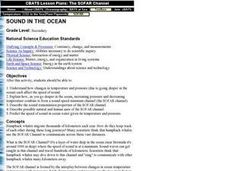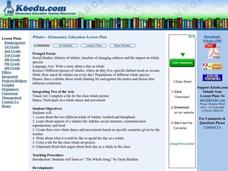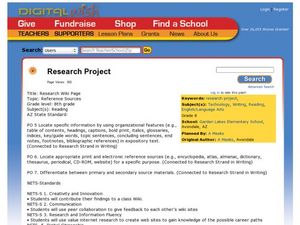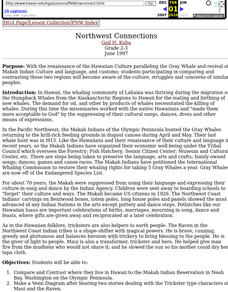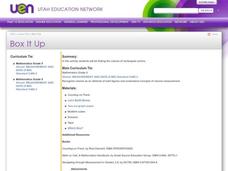SeaWorld
Animal Migrations
Here is a fabulous set of activities for your young scientists. Each activity contains map, hands-on, and game activities that will help the class understand why and how animals migrate from one place to another. First they'll examine...
Curated OER
How Big Is A Humpback Whale?
Students explore humpback whales. In this humpback whale lesson, students determine the actual size of humpback whales and use diagrams to identify the major features of the humpback whale.
Curated OER
SPLASH – Monitoring Humpback Whales
Learners view a video about the humpback whale and why it is endangered. In this endangered species lesson plan, students recognize the importance of observing and following an endangered species in an ecosystem. Learners identify the...
Learning to Give
Humphrey The Lost Whale
The children's book Humphrey the Lost Whale tells an amazing tale of a community joining together for a common cause. Read this book with your class, making connections between the events in the story and personal experiences of young...
Curated OER
Fluke: Whale Watching Activity
Sixth graders observe and record data about humpback whales in Hawaii. In this humpback whale watching lesson plan, 6th graders watch the activity of whales from a Hawaiian beach. They record data about their behavior and complete a...
Curated OER
In the Company of Whales
Students examine whales and how they migrate. In this whale lesson students research whales and their migration patterns.
Curated OER
Marine Life: Anatomy of a Humpback
Third graders prepare for a trip to view marine life. In this science lesson plan, 3rd graders assemble a picture of a Humpback whale on a grid.
Curated OER
Whale Migration - The Long Journey
Marine biology learners examine right whale sighting data from the WhaleNet website. They plot the data on a map and write down the number of adults and calves spotted. Questions accompany the data analysis activity, making this a...
Curated OER
Baleen Whales vs. Toothed Whales
Second graders review mammal characteristics and study two types of whales. In this mammal study lesson, 2nd graders discuss mammals and define their five characteristics. Students complete a whale worksheet and define differences...
CBATS Lessons
Sound In The Ocean
An outstanding lesson designed for secondary oceanographers is here for you. In it, youngsters study how the conditions of the ocean impact the migratory patterns of humpback whales. They discover the SOFAR technology, which is a way to...
Curated OER
Big on Blubber: How do Whales Stay Warm?
Students explore biology by conducting a science experiment in class. In this whale anatomy lesson, students identify the use of whale blubber for the animal to stay warm in cold waters while utilizing ice, vegetable oil, plastic bags...
Curated OER
Whales
Learners compare and contrast the two types of whales. In this biology instructional activity, students research the characteristics of their assigned whale. They compile their findings in a folder.
Curated OER
Whales
Students study the history of whales. In this whale lesson plan, students research two types of whales, color a tile, and write a one page paper. The tiles may be combined to make a group picture.
Curated OER
Lesson Plan on Migration
Fourth graders diagram written and oral directions of a Native American, European Viking, Right Whale or Humpback Whale migration route, the student diagram all directions only in the sequence given, with arrows indicating direction of...
Curated OER
Research Project
Young scholars learn the importance of National Marine Sanctuaries and create an original illustrated research project.
Curated OER
Northwest Connections
Students compare and contrast where they live in Hawaii to the Makah Indian Reservation in Neah Bay, Washington on the Olympic Peninsula, then make a Venn Diagram after hearing two stories dealing with the Trickster type characters of...
American Museum of Natural History
Around the World with DNA
DNA analysis could be what saves some animals from extinction. An interactive lesson shows learners how DNA information proves variation among animals of the same species and how stakeholders use that information to make decisions. Easy...
Curated OER
Blue Planet: Tidal Seas
Young scholars investigate how tides affect sea life. In this video based lesson plan, students view a video on how tides affect sea life. They do web-based research to find the answers to a series of questions and then play Tidal Trivia...
Curated OER
Frozen Seas
Students research animal life in the frozen seas. In this researched based lesson, students use the Internet to create a poster about an animal that lives in an Arctic or Antarctic environment. Students will focus on the behavioral and...
Curated OER
Hawaiian Hot Spots
Students discuss how plate tectonics and volcanic activity have affected Hawaii. In this Hawaiian lesson plan, students look at maps and photographs of Hawaiian Islands and discuss their formation through multiple volcanic eruptions....
Curated OER
Blue Planet: Seas of Life - Tidal Seas
After viewing the video Blue Planet: Seas of Life, students review oceanic concepts. In this earth science lesson, students reflect on the effect tides have on living things and conduct research to create a "tidal trivia" game. Students...
Curated OER
Box It Up
Fifth graders make boxes. In this prisms lesson, 5th graders read the book Counting on Frank and discuss the different things that the boy measures. Students make boxes of various sizes using graph paper and find their volume.
Curated OER
Hawaiian Hot Spots
Young scholars describe how plate tectonics contribute to the development of volcanoes. In this earth science lesson, students examine the map of Hawaii and explore the physical and biological environment there. They write a story about...
Curated OER
What Is a Community?
Students determine ways they can help in their communities. For this community involvement lesson, students read a story that facilitates a discussion about neighborhoods and communities. Students name the communities they belong to...









